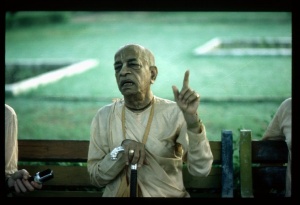CC Madhya 19.190: Difference between revisions
m (1 revision(s)) |
No edit summary |
||
| Line 1: | Line 1: | ||
{{ | [[Category:Sri Caitanya-caritamrta - Madhya-lila Chapter 19|C190]] | ||
<div style="float:left">'''[[Sri Caitanya-caritamrta|Śrī Caitanya-caritāmṛta]] - [[CC Madhya|Madhya-līlā]] - [[CC Madhya 19|Chapter 19: Lord Śrī Caitanya Mahāprabhu Instructs Śrīla Rūpa Gosvāmī]]'''</div> | |||
<div style="float:right">[[File:Go-previous.png|link=CC Madhya 19.189|Madhya-līlā 19.189]] '''[[CC Madhya 19.189|Madhya-līlā 19.189]] - [[CC Madhya 19.191|Madhya-līlā 19.191]]''' [[File:Go-next.png|link=CC Madhya 19.191|Madhya-līlā 19.191]]</div> | |||
{{CompareVersions|CC|Madhya 19.190|CC 1975|CC 1996}} | |||
{{RandomImage}} | |||
==== TEXT 190 ==== | ==== TEXT 190 ==== | ||
<div | <div class="verse"> | ||
sakhya-bhakta—śrīdāmādi, pure bhīmārjuna | :sakhya-bhakta—śrīdāmādi, pure bhīmārjuna | ||
vātsalya-bhakta—mātā pitā, yata guru-jana | :vātsalya-bhakta—mātā pitā, yata guru-jana | ||
</div> | </div> | ||
| Line 12: | Line 16: | ||
==== SYNONYMS ==== | ==== SYNONYMS ==== | ||
<div | <div class="synonyms"> | ||
sakhya- | ''sakhya-bhakta''—devotees in fraternity; ''śrīdāmā-ādi''—Śrīdāmā and others; ''pure''—in Dvārakā; ''bhīma-arjuna''—Bhīma and Arjuna; ''vātsalya-bhakta''—devotees in parental love; ''mātā pitā''—the mother and father; ''yata guru-jana''—all other similar superior persons. | ||
</div> | </div> | ||
| Line 19: | Line 23: | ||
==== TRANSLATION ==== | ==== TRANSLATION ==== | ||
<div | <div class="translation"> | ||
“In Vṛndāvana, examples of devotees in fraternity are Śrīdāmā and Sudāmā; in Dvārakā the Lord’s friends are Bhīma and Arjuna; in Vṛndāvana the devotees in parental love are mother Yaśodā and father Nanda Mahārāja, and in Dvārakā the Lord’s parents are Vasudeva and Devakī. There are also other superior persons who are devotees in parental love. | “In Vṛndāvana, examples of devotees in fraternity are Śrīdāmā and Sudāmā; in Dvārakā the Lord’s friends are Bhīma and Arjuna; in Vṛndāvana the devotees in parental love are mother Yaśodā and father Nanda Mahārāja, and in Dvārakā the Lord’s parents are Vasudeva and Devakī. There are also other superior persons who are devotees in parental love. | ||
</div> | </div> | ||
__NOTOC__ | |||
<div style="float:right; clear:both;">[[File:Go-previous.png|link=CC Madhya 19.189|Madhya-līlā 19.189]] '''[[CC Madhya 19.189|Madhya-līlā 19.189]] - [[CC Madhya 19.191|Madhya-līlā 19.191]]''' [[File:Go-next.png|link=CC Madhya 19.191|Madhya-līlā 19.191]]</div> | |||
__NOTOC__ | |||
__NOEDITSECTION__ | |||
Revision as of 02:49, 4 September 2021
Śrī Caitanya-caritāmṛta - Madhya-līlā - Chapter 19: Lord Śrī Caitanya Mahāprabhu Instructs Śrīla Rūpa Gosvāmī

His Divine Grace
A.C. Bhaktivedanta Swami Prabhupada
A.C. Bhaktivedanta Swami Prabhupada
TEXT 190
- sakhya-bhakta—śrīdāmādi, pure bhīmārjuna
- vātsalya-bhakta—mātā pitā, yata guru-jana
SYNONYMS
sakhya-bhakta—devotees in fraternity; śrīdāmā-ādi—Śrīdāmā and others; pure—in Dvārakā; bhīma-arjuna—Bhīma and Arjuna; vātsalya-bhakta—devotees in parental love; mātā pitā—the mother and father; yata guru-jana—all other similar superior persons.
TRANSLATION
“In Vṛndāvana, examples of devotees in fraternity are Śrīdāmā and Sudāmā; in Dvārakā the Lord’s friends are Bhīma and Arjuna; in Vṛndāvana the devotees in parental love are mother Yaśodā and father Nanda Mahārāja, and in Dvārakā the Lord’s parents are Vasudeva and Devakī. There are also other superior persons who are devotees in parental love.